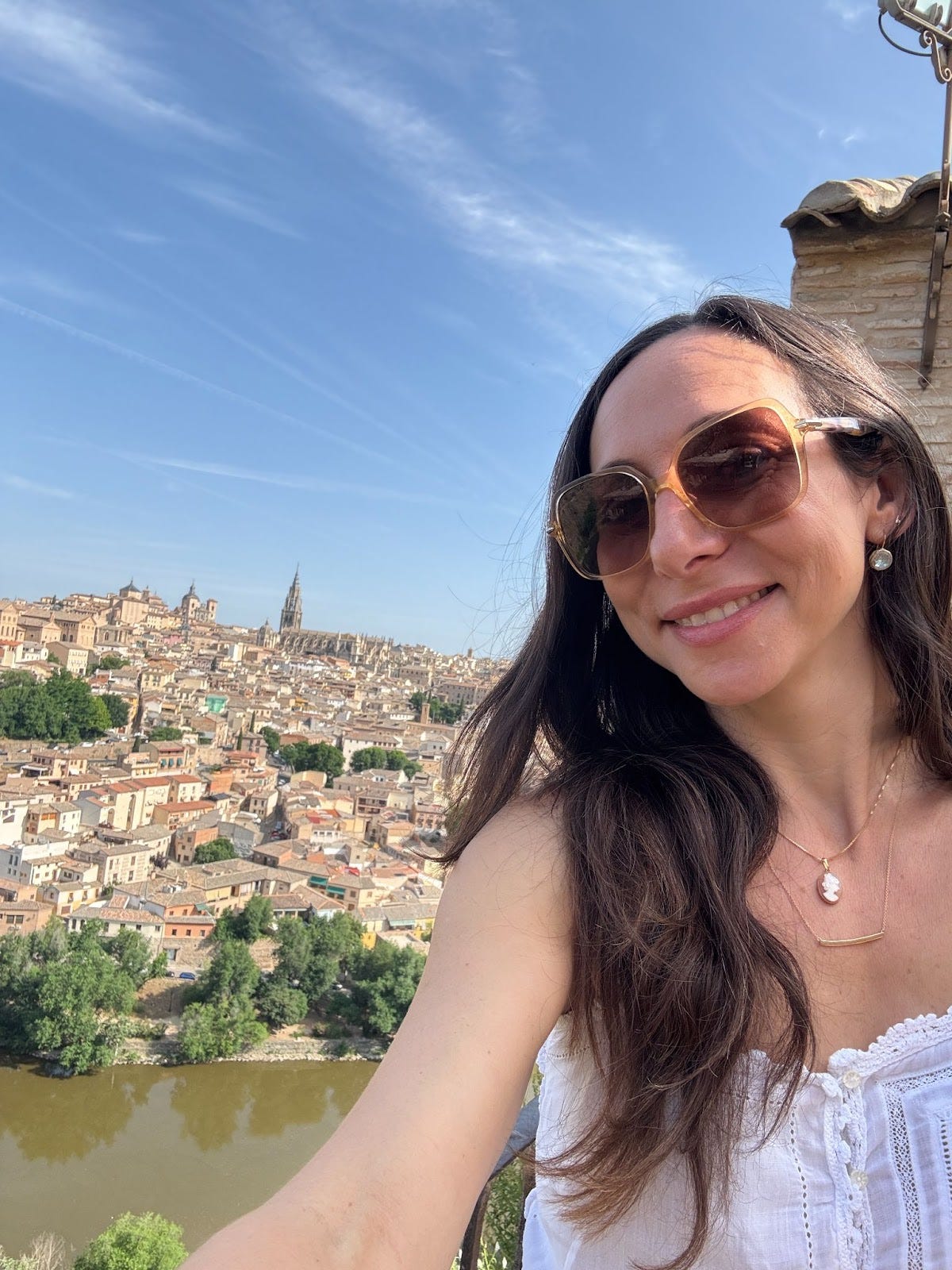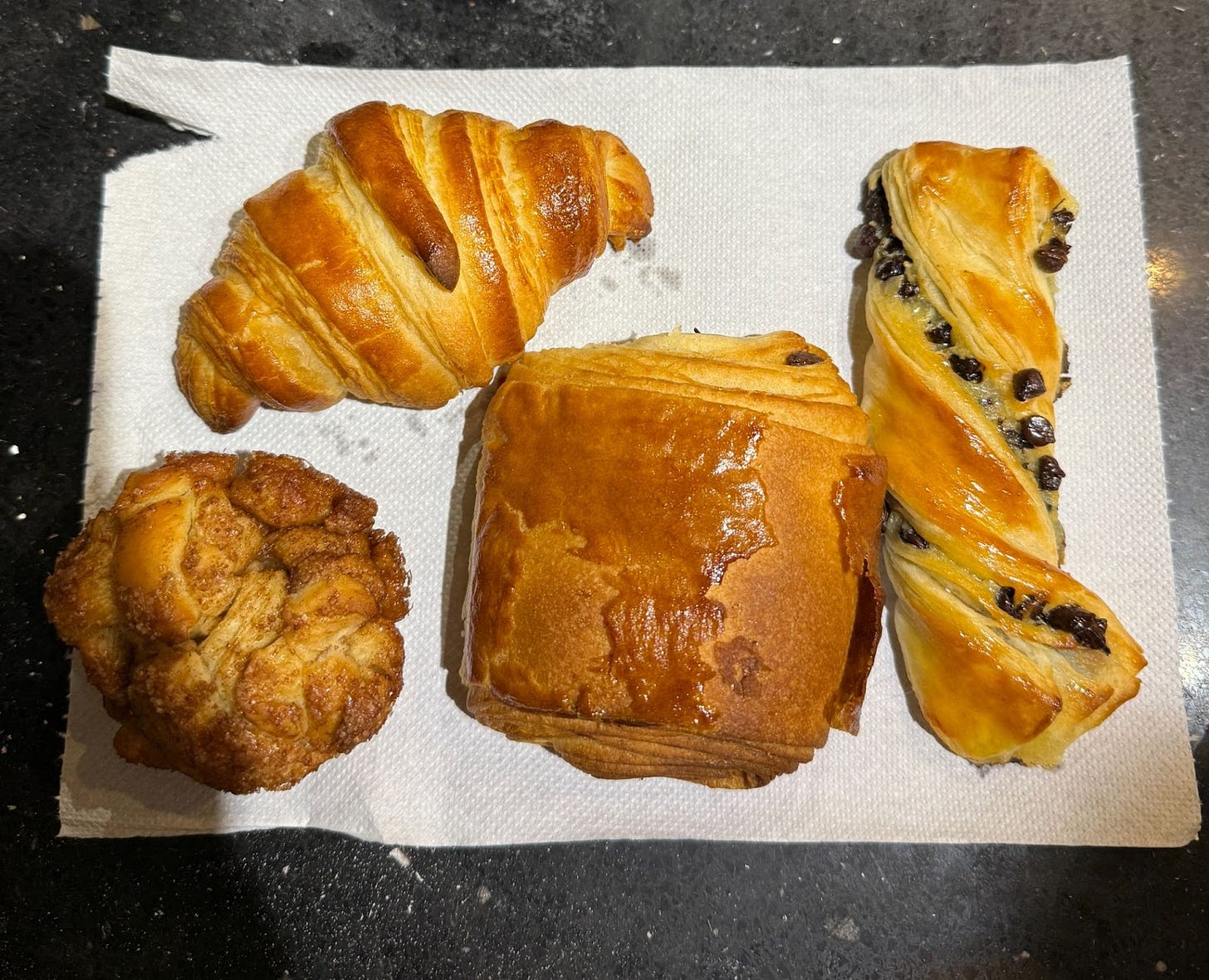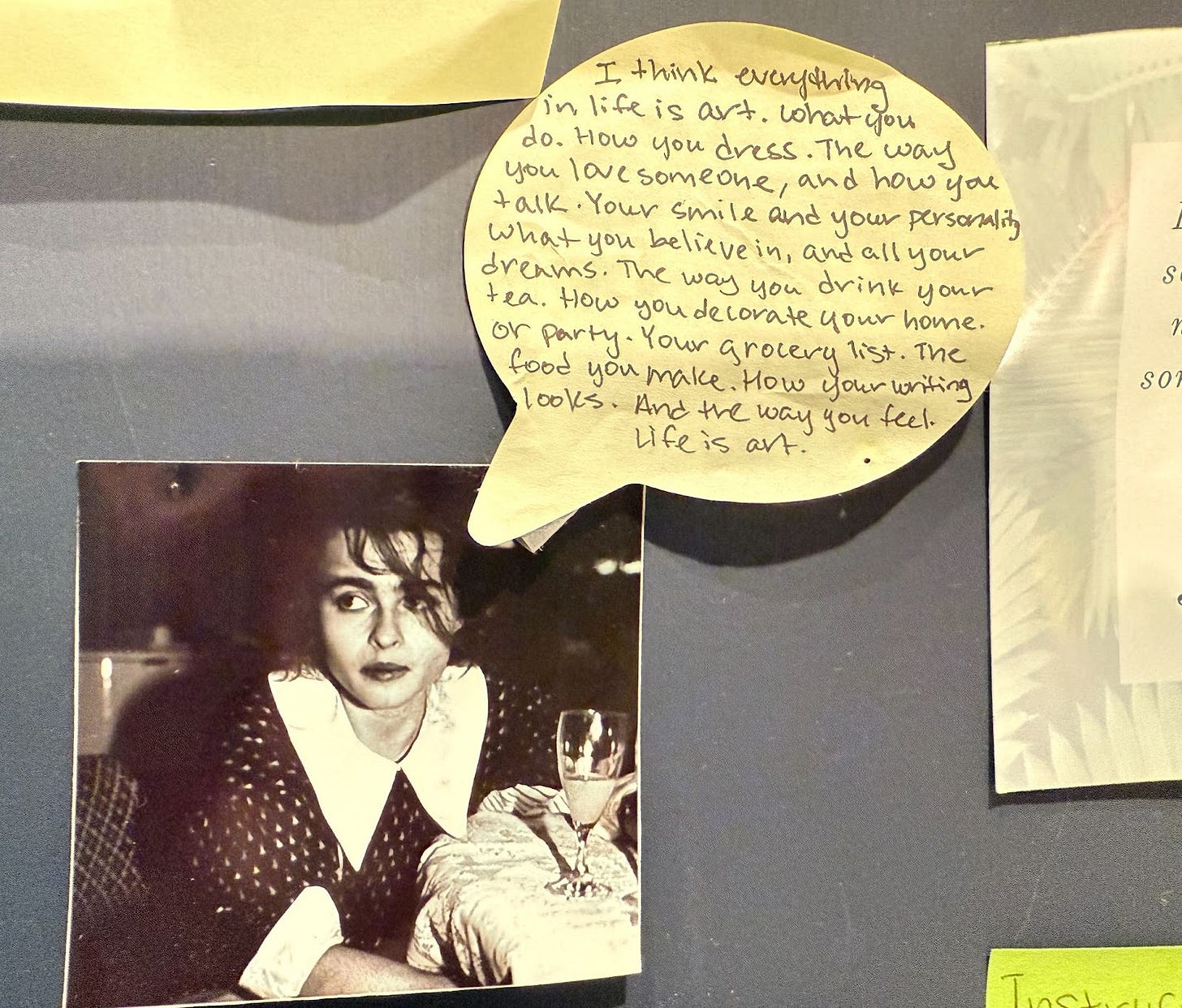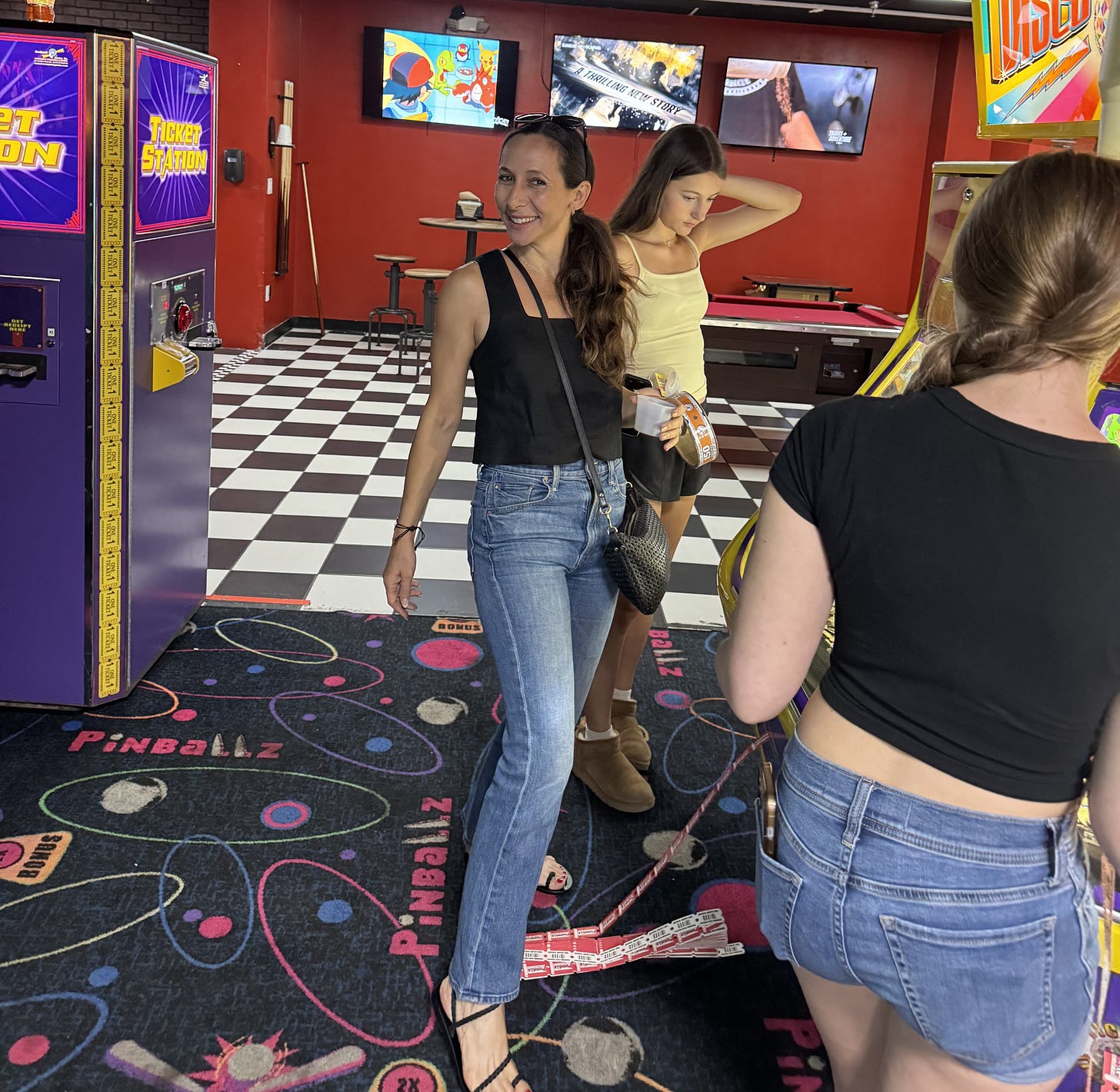Long Time, No Write
Life as art and finding my way back to the page
I haven’t written since June 7.
Technically, I didn’t even write that day — I just scheduled a post I’d written weeks before, knowing I’d be traveling. This is the longest stretch I’ve gone without writing since I began this Substack. Oddly, I feel proud: I set out to make writing a regular practice, and I did. But it also feels strange, because for the first time, I haven’t wanted to write.
I blame Europe.
For the month of June, my family travelled through Spain, France, and Portugal, where I filled my days eating, walking, exploring, learning, and just being. I fell into bed each night with a smile on my face. When I tried to read my book, I abandoned it after a page or two. And writing? It never even crossed my mind.
Well…one exception. Thanks to the prompting of my writing group, my family members and I each kept a travel journal. Most days, we’d pause to write, draw, or paste little scraps of our adventures into the journal — a napkin from Pierre Hermé, my favorite macaron shop in Paris, or a detailed rant about the worst meal of the trip (a gray, flattened steak drowning in a white, gelatinous “sauce”) in Setubal, Portugal. But this wasn’t my usual writing. The laptop I’d lugged across the Atlantic sat neglected in my bag for the entire four weeks.
At first, I wondered, What is wrong with me? How could I be surrounded by so much beauty and not want to write? Or even read? Then one night, as Brandon and I were getting into bed, I had a realization.
“I don’t think I want to read,” I told him, “because I don’t want to leave this moment. I don’t need the escape.”
And writing? I didn’t even notice its absence until I got home.
It reminded me of how I sometimes forget to take photos at birthday parties or on holidays. Not because I don’t care, but because I’m so immersed. Driving through the Basque Country, making croissants in Paris, wandering the cobblestones of Porto—those felt like creative acts in and of themselves. Making something out of words just didn’t feel necessary.
Being in Europe was like living the Helena Bonham Carter quote I have taped to the wall next to my desk:
“I think everything in life is art. What you do. How you dress. The way you love someone, and how you talk. Your smile and your personality. What you believe in, and all your dreams. The way you drink your tea. How you decorate your home. Or party. Your grocery list. The food you make. How your writing looks. And the way you feel. Life is art.”
I have looked at and loved this quote for a long time, but traveling through Europe made me feel it in my bones. My creativity didn’t need an outlet. It was everywhere.
This sentiment was validated when Austin Kleon recently wrote something similar after his vacation in Hawaii: “I don’t think I had a single creative thought while I was out there.” I read that and thought: Yes. Exactly.
But then he added, “My brains only came back to me once I returned to the mainland.”
And that’s where the camaraderie ended. Because when I returned to Austin (coincidentally, where Kleon also lives), my brains didn’t come rushing back. Instead, I fell into what my friend Kim calls “post-European depression.” All I wanted was to go back. I tried to re-create Europe in small ways: lingering over coffee, shopping at the farmers market, making meals from scratch, walking by the lake. After two weeks of that, I finally got the urge to write again. I dumped a messy draft of this very post. Then I didn’t touch it for another six weeks.
Partly, I was soaking up summer with my kids—swimming, arcades, mall runs, movies. In some ways, I was still living Helena Bonham Carter’s line: life is art. But there was something else. I wasn’t just not writing — I was avoiding writing. Something had shifted.
And then one night, while doing dishes, I listened to a conversation between Esther Perel and Trevor Noah. They were talking about the difference between being in America and being in Europe (or South Africa). In America, the first question people ask is: What do you do? Meaning: what do you do for work, how do you earn money, how do you justify your place here? In Europe, no one cares what you do. They care about being present with you, sharing an experience.
I paused the episode, sponge in hand, because that was it.
For as long as I can remember, I’ve hated that question. “What do you do?” In my twenties, I worked as a film and video editor—which sounded glamorous to everyone else, but felt suffocating to me. Later, I became a social worker, a role I considered deeply creative, but less “sexy” to describe at dinner parties. Then came the wellness startup I hated telling people about because the word “wellness” has become gross. And finally, there’s the pandemic, when I stopped working altogether. Not having a tidy answer made me feel small, even though I was raising kids, writing essays, volunteering, and taking classes.
In Europe, though, almost no one asked me “What do you do?” Over four weeks, only two people wanted to know: the American mom of a boy my son befriended, and a Portuguese tour guide named José, on our last day of the trip. I told both of them I was a social worker, but with José, Brandon added, “She’s also a writer.”
“And a writer,” I nodded, smiling at Brandon, still feeling unsure about that as a label affixed to me.
But José wasn’t asking to size me up. He was just connecting with me.
What we “do” becomes a label attached to us, like names. In the US, these are often used as shorthand for our value. Maybe that’s why I didn’t want to write. I wasn’t worrying about producing something or what people would think if I didn’t. I was enjoying the simple act of just being—and letting that be enough. Like the feeling I had in Europe, I wanted to hold onto it for as long as I could.
The labels (including names) ascribed to me are still something I contend with. Some days they fit, some days they don’t. But maybe that’s the point—names and labels shift. Helena Bonham Carter says life is art—the way you drink your tea, the way you smile, the way you feel. For me, sometimes it’s also the way I put words on a page. Not always. Not every season. But sometimes. And maybe that’s enough.






